Working with farmers to help them feed the world sustainably
Committed to UN Sustainable Development Goals

As we make agriculture climate-resilient, we directly impact the prosperity of our farmers. This directly aids in alleviation of poverty and contributes to No Poverty.

Improved nutritional value of crops themselves, plus more access to food, builds food security of a region and helps make Zero Hunger possible.
The Advanta difference
Promoting crops that are good for the environment to reduce agriculture’s environmental footprint whilst minimizing our own environmental impact.
Panhandle Runs on Water Campaign Texas
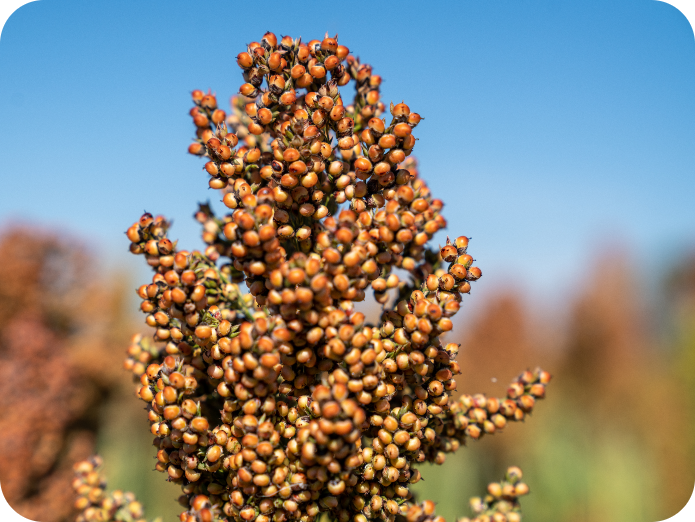
Alta Seeds, our brand in the US is a flagship sponsor with Texas Water Foundation and Amarillo ABC7 News for Multiplatform educational series about importance of water conservation, especially in light of the declining aquifer, increasing drought in TX Panhandle and the region. Alta Seed promotes sorghum water-usage optimization over corn advantages and is an exclusive sponsor for the sorghum seeds.
Between TV and web/digital, the campaign will generate approximately 2.5 million impressions per quarter. Alta Seeds engages actively in water conservation projects and promotion of water efficiency crops like sorghum.
Timeline : May – December 2021
Goal : To develop water conservation awareness and promote water efficient crop sorghum
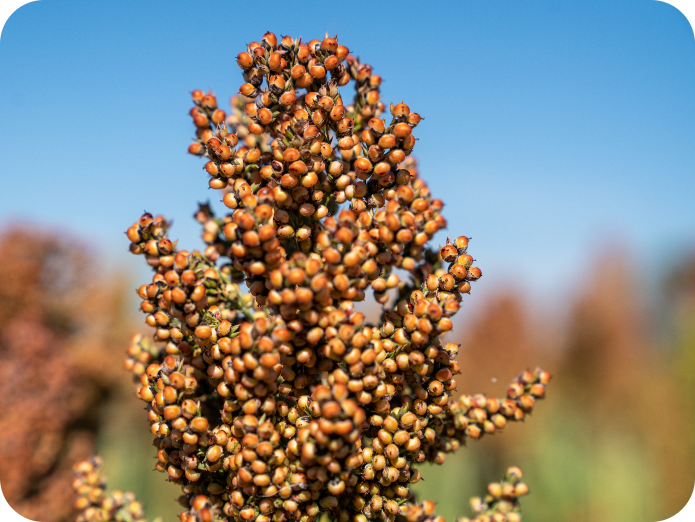
Promoting crops that are good for the environment to reduce agriculture’s environmental footprint whilst minimizing our own environmental impact.
Advanta’s sorghum contributing to Zero Carbon Argentina Program
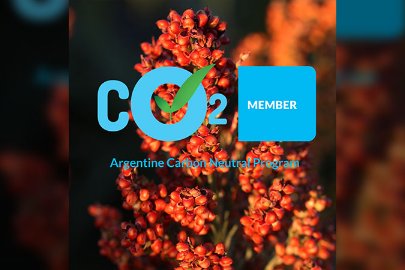
“Programa Argentino de Carbono Neutro” or “Zero Carbon Argentine Program” aims is to determine the greenhouse gas emissions in the production of food, beverages, and biofuels in the country, to implement good agricultural or manufacturing practices to reduce such emissions, and finally, to determine the balance of carbon in the production process.
Advanta Seeds contributes to this program by providing data for sorghum seed production.
The outcome of this project is to develop a Manual for CF calculation and Best Practices for seed cluster and grain harvested cluster at farmer level.
It will allow Advanta to measure CF of Advanta´s sorghum seeds production and sorghum crop at farmer level compared to corn. Based on the calculation the Advanta’s sorghum seeds will have a certificate of their CF. In turn, the other value chain partners will be able to utilize it for their own CF calculation. Additionally, it will gate/reduce or negativize our CF print before certification in order to communicate it into the seed market. Alternatives: coverage crops, no tillage system, natural dry down in the field, planting forest biogas and electricity production into supply plant.
The CF certification is essential for increasing demand from food-importing countries as regards the carbon footprints of the products.
Timeline : Jan – Aug 2021
Goal : calculator for seed cluster on sorghum to measure seed production CF. Data on CF seed production for other food value chain partners.

Promoting crops that are good for the environment to reduce agriculture’s environmental footprint whilst minimizing our own environmental impact.
Reduce environmental footprint by using energy efficient lights
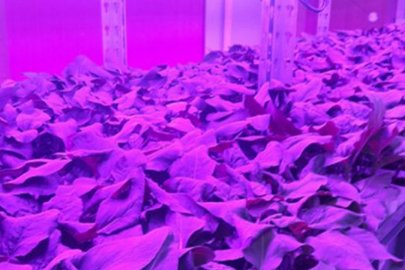
Advanta aims to reduce energy consumption and ensure cost saving with their continuous efforts in their R&D lab, Ukraine. Advanta Ukraine invested in LED lights for the sunflower ‘Orobanche Lab.’ which holds 4,500 pots per testing cycle. 30 LED units were replaced with 180 vegetative luminescent tubes. These tubes used 4,665.6 kW per testing cycle, while the LED units used just 1,555.2 kW per testing cycle. Moreover, the life of the LED lights is 3 to 5 times longer than the tubes.
The exchange of the lights has successfully reduced the cost and energy consumption by 70% and improved the trial and plant development quality.
Timeline : Implemented in 2020
Goal : To mimimize the cost and energy use by 70%. The goal is to inspire other Advanta units to become more energy efficient

Promoting crops that are good for the environment to reduce agriculture’s environmental footprint whilst minimizing our own environmental impact.
To promote green marketing through ‘print on demand’ initiative

With its planet friendly approach Advanta US launched a new idea of ‘printing on demand’ to reduce paper usage and assist a smooth transition to digital collateral. The focus here was on saving trees by considerably reducing the amount of paper used in printing.
For printing on demand, Advanta US partners with a company that uses green printing techniques such as vegetable and soy-based inks, precise ink mixing practices for zero ink waste, paper and plastic and metals that are recycled throughout their printing plants. Energy-efficient lighting and insulation are also used in their facility.
Print on demand saves trees, preserves resources and reduces the amount of waste involved in large print runs. It allows printing only what is necessary and ensures marketing materials are always accessible and up-to-date.
Digital materials provide a value-added service for Advanta’s channel partners to quickly and efficiently access the required marketing materials.
Timeline : Implemented in 2020
Goal : To reduce the use of paper and enhance digital marketing material efficiency. The goal is to promote green marketing.

Promoting crops that are good for the environment to reduce agriculture’s environmental footprint whilst minimizing our own environmental impact.
Venado Tuerto R&D recycling scheme

We, at Advanta, aim to make an impactful difference to the planet by increasing waste management awareness and recycling. The R&D Team in Venado Tuerto, Argentina, takes recycling and separating trash very seriously. The entire team participates in recycling and the station has collection points throughout the facility, not letting anything go to waste.
Everybody is involved, and the employees follow a schedule to take the recycled trash to the nearby city's collection centers. The recycled paper is donated to the ‘Oveja Verde’ (‘Green Sheep’) project, which sells the paper to support the IMAGINA youth organization.
To ensure the efficiency of the recycling project and make it successful, all employees participated in a recycle training. Since the project started in 2016, tons of plastic, hundreds of batteries, paper bags and a few vans full of cardboards have been collected and recycled.
Timeline : Implemented in 2016
Goal : To reduce environmental impact and increase support for local community.
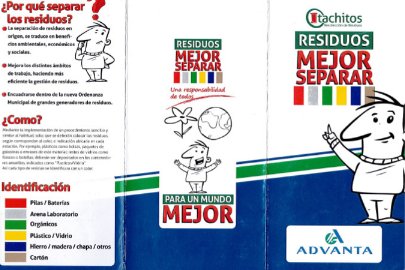
Securing global food security by promoting cultivation of climate smart crops
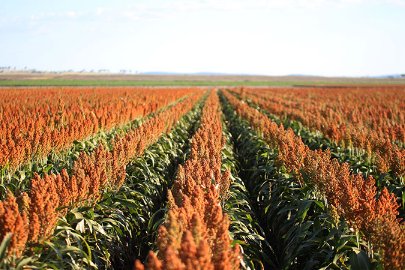
Grain sorghum, with its natural high stability characteristics, drought and heat tolerance, and nutritional values for human and animal consumption, is a crop of the future that can face global warming and climate change.
Advanta Seeds spent decades researching the crop’s adaptability to high temperatures, harsh conditions and ultimately resistance to drought. Our genetics are tested and adapted to the local climate. With climate uncertainty and environmental conditions becoming more challenging, sorghum is perfectly positioned to step into the void of other crops becoming more difficult to grow.
For example, reduced water availability for traditionally grown crops makes more growers turn to sorghum. Sorghum has low water requirements and high drought tolerance. In many regions of Europe, South America or Asia, sorghum is a relatively new crop. Still, the demand is growing, and more farmers start to grow sorghum.
R&D centers in America, Africa, India, Thailand, Australia, Mexico, Indonesia, Brazil, Argentina and Ukraine to deliver tailored solutions for regions. We are developing climate-smart crops resilient to drought, high temperatures and extreme weather conditions.
Timeline : Initiated in 2019
Goal : To adapt sorghum and make it sustain drought in various geographies, high temperatures or other extreme weather conditions

Hybridization of sunflower in Tanzania

As part of our efforts to improve technology access across the agricultural sector, Advanta launched the Hybridization in Sunflower Market project in Tanzania. Initiated in 2020, and scaled up in 2022, the project aims to improve the resilience, productivity and livelihoods of farmers who rely on sunflowers as their main oil seed crop. While certified open pollinated cultivars are grown by only a small percentage of farmers in the country, the majority still rely on farm-saved seeds due to a lack of understanding of high-yielding hybrids and an absence of fertilizers.
To address this issue and introduce farming communities to new Advanta’s new technologies, we provided 660 Village-based Agricultural Advisors (VBAs) in 23 districts with nearly 20,000 packets of hybrid sunflower seeds which produce higher yields and better prices on oil content. Advisors held regular field visits and educated farmers on utilising Advanta hybrid seed production technology through a series field days held in various regions. The training included information on topics such as agronomy, plant protection, and the cost-benefit analysis of cultivating and profiting from hybrid sunflowers. In line with our OpenAg purpose which places collaboration at the heart of progress, Advanta has worked alongside several NGOs including FIPS, Farm Africa, and CARE International, to set up additional demonstrations – reaching 19 districts with 980 VBAs. Additionally, Advanta has directly connected with 267 farmers' organizations, comprising a total of 13,064 farmers, to provide them with information on hybrid seed availability and purchase options.
The farmers who adopted the hybrids saw a significant increase in yield and profitability, with yields more than twice that of open pollinated varieties and a greater oil content. Many farmers reported an improvement in their social status and an ability to provide a better life for their children through better education. Advanta's efforts to promote the use of hybrid seeds, sell them at fair prices, and connect with farmers through B2B meetings has resulted in a significant increase in the number of local stockists who sell hybrid seeds, giving farmers more options for access to these seeds.
The acceptance of hybrid sunflower seeds in Tanzania has been a gradual process, but with the help of stakeholders like AMDT and seed companies, we expect that in the future, Tanzanian farmers will increasingly rely on hybrid seeds, increasing the amount of edible oil produced, reducing their dependence on foreign currency, and enhancing their productivity and profitability.
Today in Tanzania, Advanta’s hybrids represent more than 60 percent of the sunflower hybrid seeds market with over 100 MT hybrid seeds. The next year target is to reach more than 200 MT of hybrid seeds in Tanzania market.
Advanta plans to continue this program and to increase new technologies, such as high oleic and clear field hybrids, which can further to advance the sunflower market.
Timeline:May – December 2021
Goal:To develop water conservation awareness and promote water efficient crop sorghum

Opening up access to quality seeds for smallholder farmers to diversify crops and increase their productivity and income. We aim to provide access to quality seeds to 40 million smallholder farmers by 2025. We are also building their entrepreneurial capacity with seed production contracts. We are aiming to involve 65,000 smallholder farmers in our seed production by 2025.
Changing the face of agriculture with sunflower cultivation in Tanzania

As climate change affects agriculture in Africa, farmers are turning to drought-tolerant crops such as sunflower. These sunflower seeds are mainly used for the production of cooking oil and oil cake. Sunflower oil is the 4th most consumed cooking oil in African households.
Advanta Seeds, in partnership with Farm Africa, Bytrade Tanzania and Agriculture Market Development Trust (AMDT), developed a program to provide farmers with quality sunflower seeds OP and hybrids and agronomy training. The scheme impacted around 20,000 farmers in Tanzania and significantly improved the farmers' yield and productivity. Most of the farmers turned from OP to hybrids to assure crop performance.
Timeline : Implemented in 2018
Goal : Introducing new seed technologies in Tanzania, hybridization to enhance the local agriculture and farmers prosperity

Opening up access to quality seeds for smallholder farmers to diversify crops and increase their productivity and income. We aim to provide access to quality seeds to 40 million smallholder farmers by 2025. We are also building their entrepreneurial capacity with seed production contracts. We are aiming to involve 65,000 smallholder farmers in our seed production by 2025.
Securing farmers income with crop diversification in Thailand

Encouraging crop diversification, Advanta Seeds offered discounted corn varieties to farmers cooperatives across 40 provinces in Thailand. The discount aimed to encourage farmers to grow corn after the rice season and reduce their dependence on one crop. This initiative is coordinated with BAAC to provide credit for farmers, and Betagro, a corn processing company, to buy the crop. Advanta Seeds provides quality seeds and agronomy training and helps to monitor the growth of the crop. In 2020 more than 20,000 farmers were growing corn on 25,000 hectares as a part of the crop diversification program.
Timeline : Implemented in 2019, MOU with Betagro
Goal: Securing smallholder farmers income

Enabling women farmers with quality seeds, adjacent technologies, tailored programs and more, as in Southeast Asia and Africa, women participation in agriculture is about 80%. We aim to have 60% of our seed production contracts in Thailand granted to women farmers by 2025.
Advanta Indonesia shortlisted for the UN Women WEPs Awards.

We are immensely proud to have the genuine dedication and hard work of Advanta Indonesia getting recognition. We are one of the few finalists for the UN Women 2020 Asia-Pacific WEPs Awards. Out of over 400 applications from 17 countries, Advanta Indonesia made it to the final by impressing the judges with a thoughtful program for empowering women farmers during the Covid pandemic crisis.
Advanta contacted women directly to invite them on a priority basis to Advanta's crop and technology demonstrations. At the events, Advanta provided designated health and safety checks and seating areas for women only. Additionally, all women received safety kits. As a result of this targeted marketing campaign, women's participation increased by 30%, followed by many seed inquiries and engagement through social media.
Timeline : Implemented in 2020
Goal : To increase women participation in crop demos and technology trainings to 75%

Enabling women farmers with quality seeds, adjacent technologies, tailored programs and more, as in Southeast Asia and Africa, women participation in agriculture is about 80%. We aim to have 60% of our seed production contracts in Thailand granted to women farmers by 2025.
Changing the lives of Tanzanian Women with sunflower cultivation

Advanta partnered with UN Women and Farm Africa to empower women with hybrid sunflower seeds. It is a joint program titled ‘Realizing Gender Equality through Empowering Women and Adolescent Girls’.
The objective is to empower economically and improve the social status of women and female youth farmers. Each female farmer received agronomy training and one kilogram of hybrid sunflower seeds. Over 300 farmers had participated. The farmers confirmed that it was the best crop performance they had ever experienced in sunflower cultivation, and that they were looking forward to planting the hybrids next year.
Timeline : 2020-2021
Goal : To empower women and adolescent girls in Tanzania by enhancing their economic and social status

Programs for youth that promote a healthy diet, such as school or community gardens. We support the training of next-generation farmers and developing agriculture professionals through collaboration with universities and formal agriculture education institutions.
Boosting nutrition in schools in Thailand

We engaged with the local government and community leaders to launch a nutrition program in Nong-Kae Sub-district, Thailand. The opening event was held at Wat Tan Sian School with vegetable planting demonstrations and sports activities for children. There were about 30 teachers and over 200 children participating. The project aimed to create awareness on nutrition and teach children how to grow their vegetables. We provided seeds for tomatoes, baby corn, okra and chilli seeds and agronomy support to harvest time. After the harvest, the vegetables were used for the children's meals and shared with the community.
Timeline : Initiated in 2020
Goal : To improve nutrition in schools, extend the reach of the program to more schools

Protecting agrobiodiversity with the development of a diversified portfolio of field and vegetable crops to promote food system resilience, sustainability and nutrition. We are forging partnerships to improve farmers’ access to the market as well as the development of the best genetics through collaboration. We contribute to the nutritional needs of a growing global population with biofortified crops and varieties of nourishing vegetables.
Breeding super-nutritious crops to help solve global hunger

We realize that biofortified crops are the best way to reduce malnutrition and improve the lives of millions of people. Biofortification increases the density of essential vitamins and minerals in a crop and can be achieved through specific agronomic practices or conventional plant breeding and modern biotechnology.
We partnered with HarvestPlus and CIMMYT to biofortify staple crops for smallholder farmers to improve nutrition intake and crop health.
We have a few programs for super-nutritious crops in Africa and Asia. Our orange maize enriched with vitamin A in Zambia is now introduced to South Africa, Tanzania, DR Congo and Angola. We are launching beans enriched with Iron and Zinc and rice fortified with Zinc. We are also in the process of testing nutritious Iron Pearl Millet in India.
Timeline : Initiated in 2019
Goal : To reduce malnutrition and enhance nutrition in global food supply

Protecting agrobiodiversity with the development of a diversified portfolio of field and vegetable crops to promote food system resilience, sustainability and nutrition. We are forging partnerships to improve farmers’ access to the market as well as the development of the best genetics through collaboration. We contribute to the nutritional needs of a growing global population with biofortified crops and varieties of nourishing vegetables.
Red okra, an innovative way to enhance nutrition

Advanta Seeds launched an innovative crop, red okra, with enhanced nutrition value in India. Kumkum, the red okra hybrid, has a higher value of essential nutrients than regular okra. The red okra colour (due to the pigment anthocyanin) makes it richer in Antioxidants, Calcium, Iron and Zinc. It has more mucilage what makes it more nutritious and enhances its health benefits.
Additionally, Advanta’s red okra seeds give a 25% higher return on investment to farmers compared to green okra. High yield and easy cultivation benefits farmers who have already started to grow red okra for higher profits.
Timeline : Launched in 2019
Goal : To reduce malnutrition and enhance nutrition in global food supply

Protecting agrobiodiversity with the development of a diversified portfolio of field and vegetable crops to promote food system resilience, sustainability and nutrition. We are forging partnerships to improve farmers’ access to the market as well as the development of the best genetics through collaboration. We contribute to the nutritional needs of a growing global population with biofortified crops and varieties of nourishing vegetables.
Enhancing livelihood of dairy farmers through highly nutritive forage crops

We, at Advanta, have developed innovative, highly nutritious forage crops for animal feed. Our forage hybrids increase milk productivity and enable higher fat and SNF content in milk, ensuring good nutrition.
The objective for Advanta is to address the challenges faced by smallholder farmers, including limited land resources, the need for nutrition and animals health, while promoting sustainable agriculture. The benefits of feeding animals with highly nutritious forages have been recognized throughout India and some African countries like Tanzania and Kenya.
We collaborate with many NGOs in these regions to increase access to quality forage seeds to smallholder farmers. Our efforts have been recognized by the UN SDGs Partnership Platform, which aims to drive the 2030 Agenda and the 17 Sustainable Development Goals (SDGs).
Timeline : August 2018 - March 2025
Goal : Promoting sustainable farming practices and increasing profits of Indian farmers through nutritive forage crops

Protecting agrobiodiversity with the development of a diversified portfolio of field and vegetable crops to promote food system resilience, sustainability and nutrition. We are forging partnerships to improve farmers’ access to the market as well as the development of the best genetics through collaboration. We contribute to the nutritional needs of a growing global population with biofortified crops and varieties of nourishing vegetables.
Securing stable income for smallholder farmers in Tanzania

Cultivating high quality crops should be followed by a proper opportunities to sell them to achieve the goals of earning good profits. We provide farmers with such good opportunities along with providing them with high quality seeds. Smallholder farmers do not have the bargaining power to secure fair market prices and buyers for their crops. We actively look for partners in the food value chain to improve smallholders’ livelihood.
In Uganda, we partnered with Mukwano and in Tanzania with Pyxus International Oil Millers to provide regular and guaranteed income for smallholder farmers. Our sunflower seeds have the highest oleic content, which benefits farmers as well as the company. We provide seeds and training for farmers, and Mukwano Oil Millers contracts farmers and pay a good price for the grain. This partnership benefits about 20,000 smallholder farmers.
Timeline : Initiated in 2019
Goal : To create newer opportunities for small holder farmers and ensure steady earnings for each household.

Creating opportunities of employment on and off the field. Empowering hands and minds to push the boundaries to make agriculture sustainable and food security a reality today and for tomorrow.
Creating opportunities of employment on and off the field.

Empowering hands and minds to push the boundaries to make agriculture sustainable and food security a reality today and for tomorrow.
1200 employees representing 25 countries. 24 stations of seeds production & processing sites across 21 countries.
84 countries with commercial presence and employees in 25 countries.
44% of our workforce are customer facing to deliver quality seeds to farms in every environment ( South Asia).
28% of our workforce manages seed production and seed distribution worldwide (Africa and middle east).
19% of our workforce researches plant genetics to ensure we deliver breakthrough seed technology (Europe).

Social Impact
Globally our teams have pledged to take up a sustainable life.
“I pledge to promote Advanta’s commitment to the UN Sustainable Development Goals and promote sustainable agriculture. We need to rethink how we grow, share, and consume our food. I pledge to be an active participant in improving access to quality seeds which contributes to achieving food security globally. I pledge to make changes in my daily life that will minimize social and ecological consequences on our environment. I will encourage my community, colleagues, and family, to pursue a lifestyle that ensures a better and more sustainable future for all.”
United against child labour
Advanta addresses chlild labour, one of the gravest social issues that affect the life of unprivileged children all over the world. ‘United against Child Labour’ was an initiative started by us to actively fight child labour. The aim is to eradicate the existence of child labour from the whole farming chain. To give shape to this initiative we have designed and executed awareness programs that advocate the need for change in the rural communities. Government institutions, educational institutions and media have been our constant source of assistance to take the initiative forward.
Human Rights Policy
As a UPL Company we adhere to all corporate human rights commitments and polices as defined by our parent group.
To know more follow the link below.
Farmer Impact Stories
Our impact on the agricultural community stories


 Ukraine
Ukraine Romania
Romania Brazil
Brazil Thailand
Thailand USA
USA Argentina
Argentina Indonesia
Indonesia Kenya
Kenya Moldova
Moldova